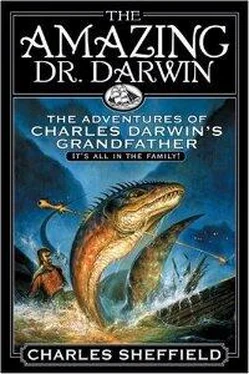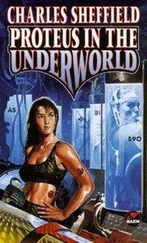After a couple of minutes of silent inspection of the bleak prospect, rising crest upon crest to the distant, hidden summit, Thaxton shook the reins to drive on.
“Wait—don’t go yet!” Darwin’s sudden cry halted Thaxton just as he was about to start the coach forward.
“What is it, Dr. Darwin? Is something the matter?”
Darwin did not reply. Instead, he opened the carriage door, and despite his bulk swung easily to the ground. He walked rapidly across the common, to where a boy about ten years old was sitting by a stone milestone. The lad was deformed of feature, with a broad, flattened skull and deep-set eyes. He was lightly dressed in the cast-off rags of an adult, and he did not seem to feel the cold despite the biting breeze.
The child started up at Darwin’s approach, but did not run away. He was less than four feet tall, heavy chested and bowlegged. Darwin stood before him and looked at him with a professional eye.
“What is it, Erasmus?” Jacob Pole had dismounted also and come hurrying after. “What’s his disease?”
Darwin had placed a gentle hand on the boy’s head and was slowly turning it from side to side. The child, puzzled but reassured by Darwin’s calm manner and soft touch, permitted the examination without speaking.
“It is not disease, Jacob.” Darwin shook his head thoughtfully. “At first I thought it must be, but the lad is quite healthy. Never in my medical experience have I seen such a peculiar physiognomy. Look at the strange bone structure of the skull, and the curious regression of the jaw. And see that odd curve, in the relation of the thoracic and cervical vertebrae.” Darwin puffed out his full lips, and ran a gentle finger over the child’s lumpy forehead. “Tell me, my boy, how old are you?”
The child did not reply. He looked at Darwin with soft, intelligent eyes, and made a strange, strangled noise high in his throat.
“You’ll get no reply from Jimmy,” said Thaxton, who had followed behind the other two men. “He’s mute—bright enough, and he’ll follow any instructions. But he can’t speak.”
Darwin nodded, and ran his hand lightly over the boy’s throat and larynx. “Yes, there’s something odd about the structure here, too. The hyoid bone is malformed, and the thyroid prominence is absent. Tell me, Mr. Thaxton, are the boy’s parents from these parts of Cumbria?” Darwin smiled encouragingly at the lad, though his own lack of front teeth made that more frightening than reassuring. A piece of silver, pressed into the small hand, was more successful. The boy smiled back tentatively, and pointed upwards toward the fell.
“See, he understands you very well,” said Thaxton. “His mother is up on Dufton Fell, he says.” He turned away, drawing the other two men after him, before he continued in a low voice. “Jimmy’s a sad case. His mother’s a shepherdess, daft Molly Metcalf. She’s a poor lass who doesn’t have much in the way of wits. Just bright enough to tend the sheep, up on Dufton Fell and Cross Fell.”
“And the father?” asked Darwin.
“God only knows. Some vagrant. Anyway, Jimmy’s not much to look at, but his brain is all right. He’ll never be much more than a dwarf, I fear, but there will always be work for him here in the village. He’s trustworthy and obedient, and we’ve all grown used to the way he looks.”
“He’s certainly no beauty though,” said Jacob Pole. “That’s a strange deformity. You know what he reminds me of? When I was in the Spice Islands, there was a creature that the Dutch called the Orange-Lord, or Orang-Laut, or some such name. It lived in the deep forest, and it was very shy; but I once saw a body that the natives brought in. The skull and bone structure reminded me of your Jimmy.”
“It’s a long way from the Spice Islands to Cross Fell, Colonel,” said Thaxton. “And you can guess what Anna has been saying—that daft Molly was impregnated by a fiend of the fell, some diabolical incubus, and Jimmy is the devilish result. What do you think of that, Dr. Darwin?”
Erasmus Darwin had been listening absentmindedly, from time to time turning back for another look at the boy. “I don’t know what to think yet, Mr. Thaxton,” he finally replied. “But I can assure you of one thing. The only way that a human woman bears children is from impregnation by a human male. Your wife’s chatter about an incubus is unscientific piffle.”
“Impregnation is not always necessary, Doctor. Are you not forgetting the virgin birth of Our Lord, Jesus Christ?”
“Don’t get him started on that,” said Jacob Pole hastily, “or we’ll be here all day. You may not know it, Mr. Thaxton, but this is Erasmus Darwin, the doctor, the inventor, the philosopher, the poet, the everything—except the Christian.”
Thaxton smiled. “I had heard as much, to tell the truth, from Dr. Warren. ‘If you are wise,’ he said, ‘you will not dispute religion with Dr. Darwin. If you are wiser yet, you will not dispute anything with him.’ ”
The men climbed back into the coach and drove slowly on through Milburn, to Thaxton’s house north of the village. Before they went inside the big stone-built structure, they again took a long look at Cross Fell, rising vast to the northeast.
“It’s clear today,” said Thaxton. “That means that the Helm won’t be on the fell, and Anna won’t be seeing or hearing anything tonight. Dr. Darwin, I don’t know what your diagnosis will be, but I swear to God that the next twenty-four hours will be the hardest for me of any that I can remember. Come in, now, and welcome to Heartsease.”
Darwin did not speak, but he patted the other man sympathetically on the shoulder with a firm hand. They walked together to the front door of the house.
* * *
“They are taking an awfully long time.” Richard Thaxton rose from his seat by the fire and began to pace the study, looking now and again at the ceiling.
“As they should be,” said Jacob Pole reassuringly. “Richard, sit down and relax. I know Erasmus, and I’ve seen him work many times in the past. He has the greatest power of observation and invention of any man I ever met. He sees disease where others can see nothing—in the way a man walks, or talks, or stands, or even lies. And he is supremely thorough, and in the event of dire need, supremely innovative. I owe to him the lives of my wife, Elizabeth, and my daughter Emily. He will come down when he is satisfied, not before.”
Thaxton did not reply. He stood at the window, looking out at the inscrutable bulk of Cross Fell. A strong northeast wind, harsh and gusting, bent the leafless boughs of the fruit trees in the kitchen garden outside the study window, and swirled around the isolated house.
“See up there,” he said at last. “The Helm is growing. In another two hours the top of the fell will be invisible.”
Pole rose also and joined him by the window. At the top of the fell, a solid bank of rolling cloud was forming, unmoved by the strengthening wind. As they watched, it grew and thickened, shrouding the higher slopes and slowly moving lower.
“Will it be there tonight?” asked Pole.
“Until dawn. Guarding the treasure. God, I’m beginning to talk like Anna. It’s catching me, too.”
“Has there ever been any real treasure on the fell? Gold, or silver?”
“I don’t know. Lead, there surely is. It has been mined since Roman times, and there are mine workings all over this area. As for gold, I have heard much talk of it, but talk is easy. I have never seen nuggets, or even dust.”
Jacob Pole rubbed his hands together. “That’s meat and drink to me, Richard. Fiends or no fiends, there’s nothing I’d like better than to spend a few days prospecting around Cross Fell. I’ve travelled a lot farther than this, to places a good deal more inhospitable, on much less evidence. Yes, and I’ve fought off a fair number of fiends, too—human ones.”
Читать дальше












